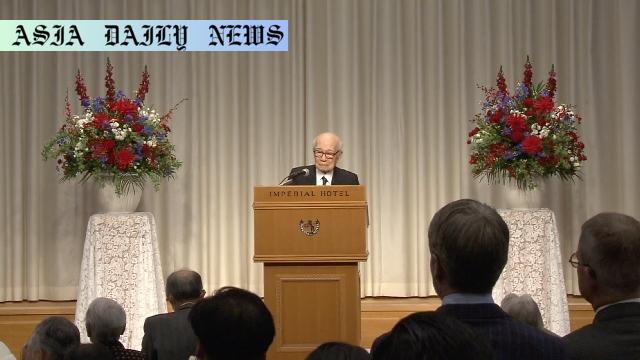Nuclear Weapons: Norway’s embassy embraces Nihon Hidankyo’s Nobel Peace Prize, spotlighting efforts to abolish nuclear weapons.
Norwegian embassy held an event to celebrate Nihon Hidankyo’s Nobel Peace Prize win in Tokyo.
Nihon Hidankyo represents Hiroshima and Nagasaki atomic bomb survivors, advocating for nuclear disarmament.
The event emphasized the urgency of nuclear abolition, marking 80 years since the bombings.
Japanese government criticized for not signing the UN Treaty on the Prohibition of Nuclear Weapons.

Introduction: A Historic Celebration
In a defining moment of international solidarity and recognition, the Norwegian embassy in Tokyo hosted a celebratory event honoring Nihon Hidankyo, the organization representing survivors of the atomic bombings of Hiroshima and Nagasaki. This vibrant gathering underscored Nihon Hidankyo’s incredible journey and recent honor as the laureate of the last Nobel Peace Prize. The recognition reflects not only their efforts in preserving the voices of atomic bomb survivors, or hibakusha, but also their unwavering commitment to nuclear disarmament.
Honoring 80 Years of Advocacy
The celebratory event was well-attended, bringing together over 150 participants, including Nihon Hidankyo members, their supporters, and inspiring high school students committed to the cause of nuclear abolition. The occasion carried great weight as it coincides with the 80th anniversary of the devastating atomic bombings. This dark chapter in world history continues to serve as a painful yet potent reminder of the catastrophic consequences of nuclear weapons.
A Powerful Message of Peace
Andreas Motzfeldt Kravik, Norway’s state secretary at the foreign ministry, delivered a resonant message, praising Nihon Hidankyo’s efforts to amplify the horrors of nuclear weapons. He expressed hope that the Nobel Peace Prize win would elevate their voice, calling on the global community to reassess the role of nuclear arms in modern conflicts. The event also spotlighted the unyielding determination of young activists like Hagi Arisa, a high school peace messenger who pledged to carry the torch of peace alongside the hibakusha.
Voicing Disappointment in Japan’s Policy
While the event celebrated progress, it was also an occasion to address significant challenges. Nihon Hidankyo co-chair Tanaka Terumi voiced disappointment in Japan’s reluctance to join the Treaty on the Prohibition of Nuclear Weapons (TPNW). He argued passionately for Japan, as the only nation to have suffered nuclear attacks, to lead global disarmament efforts. Tanaka’s appeal highlighted the importance of holding governments accountable and insisting on decisive action during the upcoming United Nations meeting in New York.
Global Efforts Toward Disarmament
The quest for nuclear disarmament remains a daunting yet imperative challenge. The Treaty on the Prohibition of Nuclear Weapons represents a beacon of hope, symbolizing a collective effort to eradicate the existence and threat of these catastrophic weapons. Events like the celebration in Tokyo play a vital role in fostering global unity and placing pressure on reluctant nations to take meaningful steps toward peace.
Conclusion: A Call for Action
The Norwegian embassy’s celebration of Nihon Hidankyo’s Nobel Peace Prize win is not just a recognition of past achievements—it is a clarion call for a nuclear-free future. As we reflect on the tragedy that occurred 80 years ago, it becomes evident that the survivors’ message transcends national boundaries and political barriers. The world must listen, and governments must act, to ensure that the horrors of Hiroshima and Nagasaki are never repeated.



Commentary
Nuclear Abolition: A Critical Turning Point
The celebration of Nihon Hidankyo’s Nobel Peace Prize win by the Norwegian embassy serves as a reminder of the enduring importance of nuclear disarmament. In today’s world, where geopolitical tensions often escalate unchecked, the necessity to ban nuclear weapons is both moral and practical. Recognizing and amplifying the voices of the hibakusha is critical in ensuring that the horrors of nuclear warfare are never forgotten, and even more importantly, never repeated.
The Role of Youth: A Bridge to the Future
What stands out most from the event in Tokyo is the involvement of young peace messengers like Hagi Arisa. Their commitment to nuclear abolition provides hope and continuity to a struggle that has been carried forward by survivors for nearly eight decades. Their perspective bridges the past with the future, ensuring that awareness of nuclear devastation remains alive as an issue that demands immediate resolution.
Japan’s Responsibility and Missed Opportunity
It is both baffling and disappointing that Japan, as a nation with firsthand experience of nuclear warfare, remains absent from the Treaty on the Prohibition of Nuclear Weapons. This omission risks undermining the country’s moral authority on the global stage, especially as the world faces the potential escalation of nuclear threats. Japan’s leadership in promoting disarmament would not only honor the memory of Hiroshima and Nagasaki’s victims but also set a powerful precedent for the global community.
Final Reflections
The movement for nuclear disarmament is at a pivotal juncture. Recognitions like the Nobel Peace Prize and the extraordinary work of organizations like Nihon Hidankyo push the conversation into the mainstream, but challenges remain. Events like the upcoming UN meeting on the TPNW and the growing involvement of young activists provide an opportunity to reignite global commitment. It’s up to all concerned citizens and nations to ensure that efforts for a nuclear-free world are sustained and ultimately realized.